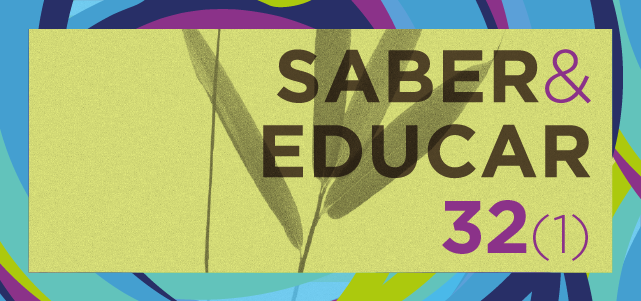As Learning Communities
Quando Escola e Famílias caminham juntas para a cidadania sustentável na Educação de Infância
DOI:
https://doi.org/10.25767/se.v32i1.32735Keywords:
Learning CommunitiesAbstract
Currently, and in view of the challenges of this century, it is essential to base Education, the right, the opportunity for equalities, diversity and social and academic equity, in the duties and rights, guaranteed and invoked by UNESCO. Designing the 2030 Agenda and the Sustainable Development Goals (SDGs) as a goal, it alerts to the need to educate for sustainability and promote a lifestyle, which is directed towards the construction of a new holistic paradigm, which makes Education accessible and feasible for All.
This article intends to prioritize the performance of inclusive practices, through successful educational actions, proposed by the Learning Communities project, where school and families share objectives, in order to ascend to the promotion of multi-thematic learning. We propose, therefore, to reflect, albeit boldly, on the proposal of conceiving the concept of sustainability as an opportunity for educational systems to be able to renew their principles, guidelines and practices, in raising awareness of and for the entire Educational Community.
Keywords: Sustainable Development Goals; Learning Communities; School; Families;
References
Abreu, D. C., & Grande, C. (2021). A caminhar para uma escola inclusiva em Portugal: os desafios sentidos pelos profissionais dos contextos educativos. Revista Educação Especial, 34, 1-22. https://doi.org/10.5902/1984686X47438
Agência Portuguesa do Ambiente (2018). Relatório do Estado do Ambiente 2018, https://sniambgeoviewer.apambiente.pt/GeoDocs/geoportaldocs/rea/REA2018/R
Assembleia Geral das Nações Unidas (1989). Declaração dos Direitos da Criança, UNICEF. https://www.unicef.org/brazil/convencao-sobre-os-direitos-da-crianca
Brundtland, G. (1987). Our Common Future: The World Commission on Environment and Development, Oxford University Press.
Câmara, A. C., Proença, A., Teixeira, F., Freitas, H., Gil, H. I., Vieira, I.& de Castro, S. T. (2018). Referencial de Educação Ambiental para a Sustentabilidade para a Educação Pré-Escolar, o Ensino Básico e o Ensino Secundário. Ministério da Educação. https://www.dge.mec.pt/sites/default/files/ECidadania/Educacao_Ambiental/docu
Carvalho, M. D. C. (2010). Aprendizagem Cooperativa: um contributo para a diferenciação pedagógica inclusiva
https://recil.ensinolusofona.pt/bitstream/10437/1209/1/disserta%C3%A7%C3%A3o.pdf
Castells, M. (1997). The power of identity. Cambridge M.A: Blackwwel.
Comunidades de aprendizagem em https://comunidades-aprendizagem.dge.mec.pt/
Davis, J. (2009). Revealing the Research ‘Hole’ of Early Childhood Education for
Sustainability: A Preliminary Survey of Literature. Environmental Education
Research 15 (2): 227–241. doi:10.1080/13504620802710607
Decreto Lei nº.54/2018. Diário da República (2018).
https://data.dre.pt/eli/dec-lei/54/2018/07/06/p/dre/pt/html
Decreto Lei nº.55/2018. Diário da República (2018).
https://data.dre.pt/eli/dec-lei/55/2018/07/06/p/dre/pt/html
Despacho n.º 6478 de 2017. Diário da República (2017).
https://files.dre.pt/2s/2017/07/143000000/1548415484.pdf
Despacho n.º 6172 de 2016. Diário da República (2016).
https://dre.tretas.org/dre/2595637/despacho-6173-2016-de-10-de-maio
Diogo, F. (org) (1998). Professores e Ensino num Mundo em Mudança – Relatório mundial da Educação, Asa Editores.
DuFour, R. (2004). What is a professional learning community?, Educational Leadership?, 61 (8), 6-11.
DuFour, R.; DuFour, R. & Eaker, R. (2008). Profissional Communities at Work: new insights for improving school, Solutions Tree.
Fidalgo, S. S. (2021). A linguagem da exclusão e inclusão social na escola. Unifesp.
Flores, M., & Ferreira, F. (2012). Currículo e comunidades de aprendizagem: Desafios e perspetivas. De Facto Editores.
Galindo, E. (2018). A psicopedagogia diferenciada na Educação inclusiva. Nova Ágora.
Global Entrepreneurship Monitor (2021). Global Report Opportunity Amid Disruption https://www.gemconsortium.org/file/open?fileId=50900
Governo da República Portuguesa. Resolução do Conselho de Ministros 56/2015 de 30 de julho. (2015), DRE https://diariodarepublica.pt/dr/detalhe/resolucao-conselho-
Governo da República Portuguesa. (2017). Acerca - Educação - XXI Governo - República Portuguesa.
https://www.portugal.gov.pt/pt/gc21/area-de-governo/educacao/acerca
Marigo, A., Braga, F., Constantino, F., Moreira, R., Mello, Roseli, Girotto, V. & Gabassa, V. (2010). Comunidades de Aprendizagem: compartilhando experiências em algumas escolas brasileiras. Políticas Educativas, 3 (2), 74-89
https://seer.ufrgs.br/Poled/article/view/22723.
OECD. (2016). Better Policies for Sustainable Development 2016: A New Framework for Policy Coherence. OCDE.
Organização das Nações Unidas. (1948). Declaração universal dos direitos do homem. ONU. https://www.unicef.org/brazil/declaracao-universal-dos-direitos-humanos
Organização das Nações Unidas (1987). Relatório Brundtland – Nosso Futuro Comum. Comissão Mundial sobre Meio Ambiente e Desenvolvimento. Editora da Fundação Gertulio Vargas.
Rodrigues, D. (2006) Investigação em Educação Inclusiva. Universidade Técnica de Lisboa.
Serrão, M., Almeida, A., & Carestiato, A. (2020). Sustentabilidade: uma questão de todos nós. Editora Senac.
Silva, G. (2021). Ludopedagogia: contribuições na educação infantil. Revista Ibero-Americana de Humanidades, Ciências e Educação, 7(5).
https://doi.org/10.51891/rease.v7i5.1224
Teodoro, A. (2003). Globalização e educação: políticas educacionais e novos modos de governação. In Cortez (Ed.), Coleção Prospectiva Volume 9. Cortez.
https://doi.org/10.15687/rec.v8i1.23928.
Thorstensen, V., & Mota, C. R. (2021). O Brasil frente ao “modelo de sustentabilidade” da OCDE. Revista Tempo Do Mundo, (25), 201–235.
Downloads
Published
How to Cite
Issue
Section
License
Copyright (c) 2023 Ana Sofia Clemente Gonçalves

This work is licensed under a Creative Commons Attribution-NonCommercial-ShareAlike 4.0 International License.
- The opinions expressed by the authors are their exclusive responsibility.
- The journal reserves the right to make the original, normative changes, spelling and grammar, in order to maintain the standard language of worship, while respecting the style of the authors.
- Authors retain copyright and grant the journal right of first publication with the work simultaneously licensed under a Creative Commons Attribution License (BY-NC-SA 4.0) that allows others to share the work with an acknowledgement of the work's authorship and initial publication in this journal.
- Authors are able to enter into separate, additional contractual arrangements for the non-exclusive distribution of the journal's published version of the work (e.g., post it to an institutional repository or publish it in a book), with an acknowledgement of its initial publication in this journal.
- Authors are permitted and encouraged to post their work online (e.g., in institutional repositories or on their website) prior to and during the submission process, as it can lead to productive exchanges, as well as earlier and greater citation of published work (See The Effect of Open Access).
PRIVACY STATEMENT
The names and email addresses entered in this journal site will be used exclusively for the stated purposes of this journal and will not be made available for any other purpose or to any other party.






